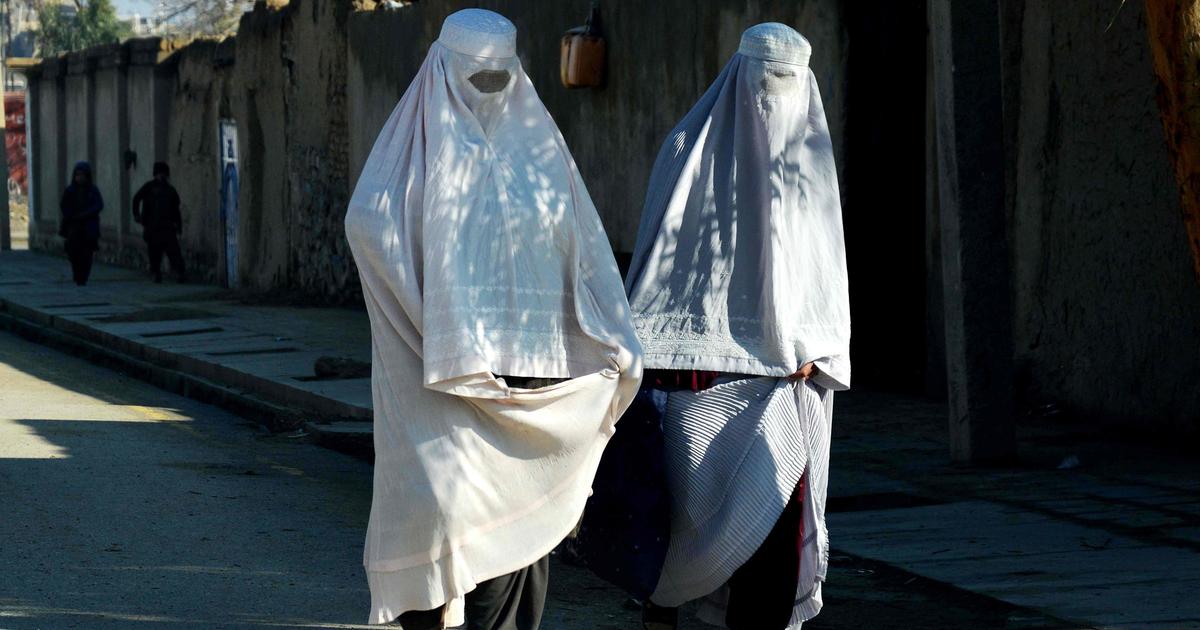Afghan Diary: “What do you want to do?
Kill us all? ”Afghanistan's women under Taliban rule
Created: 12/14/2021, 11:33 AM
How are Afghan women doing - more than 100 days after the Taliban came to power?
The international correspondent Natalie Amiri reports on moving encounters.
Kabul - Baharah limps towards me.
She has only been limping for a few weeks.
Since the competitive athlete injured herself in a fall.
She competed in international sports competitions for the Afghan national racing bike team.
I ask her if I can film the conversation.
She agrees.
She trained every day until August 15th.
Then those who forbid women to play sports came to power.
But Baharah dies for her great love: cycling. So she came up with the following: “It was November 1st or 2nd. I really wanted to keep training. So I put on men's clothes and took my brother's bike, ”she says. “When I noticed that it was working and nobody recognized me as a woman, I left again a week later, again in men's clothes. That way, I thought, I could go back to training at least once a week, ”said Baharah.
“When I drove off, shortly before a Taliban checkpoint *, my scarf, which I had tied in front of my face, fell off.
They immediately noticed that I was a woman, ”she continues.
“They started running after me, yelling to stop.
I pedaled harder and raced into a crowd - I couldn't brake anymore.
I was seriously injured in the process.
Since then I have not been able to continue my secret training ”, Baharah ends her descriptions.
She had to be operated on.
Afghanistan: 100 days of Taliban rule - how are the country's women?
Natalie Amiri reports
Not only Baharah tells me that there are more and more Taliban commandos going from door to door looking for women who have worked with the West and failed to get out.
Or that were in public, like Baharah.
"It's frightening when you hide and the door in the next house is banged loudly and you don't know whether they'll hit your door next," she tells me.
If Baharah is called from a number she doesn't know, she doesn't answer.
She has just heard of two athletes, a footsal player and a volleyball player, who were lured into a location by a phone call and killed.
She sent me the message via WhatsApp after our conversation.
After reading it, she will delete it from our chat history.
Ever since the Taliban have been controlling the streets and standing with three, four, five and six people equipped with US weapons, helmets and handcuffs, they have been asking for cell phones and checking chat histories.
If there is one thing they are familiar with, it is cell phones, an acquaintance in Kabul tells me.
They had enough time to deal with it for the past few years, cut off from the world, living in the mountains.
They didn't have anything but the Internet - that's why they are so good at it.
Natalie Amiri in Afghanistan: Taliban check cell phones - Baharah hopes for help to leave
The militias ask you to hand over your cell phone and look for suspicious messages on WhatsApp.
This can happen to anyone at any time, which is why many people delete their messages immediately after they have read or sent them.
Or, if they can afford it, they have two cell phones.
A "clean" one for the Taliban controls and one that is not shown.
Many people no longer take their cell phones with them on the street, my friend tells me.
In the second part of her Afghan Diary, the international correspondent Natalie Amiri meets two women in Afghanistan under Taliban rule.
© N. Amiri / N.
Bruckmann / M.
Litzka / afp
"We sit in the room from morning to evening and check the Internet and the news about how we can leave the country," Baharah describes to me and her tears flow, "I love my homeland, I have had several options in the past I didn't want to go to another country or stay there after a competition.
I have come back to my country every time.
I loved my country and love it. "
As a farewell, Baharah says: "I would never leave my country if it weren't for a prison".
She doesn't know how to leave the country.
She is waiting for help from Germany or another country.
Women under Taliban rule in Afghanistan: Oppression begins in the family
Like tens of thousands. More and more people are hunted down and threatened by the Taliban. And it's not just the Taliban that threaten women. The patriarchal, very conservative, often archaic society, the male part, feels confirmed by the Taliban and has begun to intimidate women who were self-employed, who studied and who encouraged other women to exercise their rights and fight for them.
The oppression in Afghanistan * begins in the family, a lecturer at Kabul University tells me.
She has not been allowed to enter the university since August.
Especially in Pashtun families - the Taliban mostly belong to the Pashtun ethnic group - people think very conservatively and do not want to see women in public.
Least of all self-confident.
Until August 15th, the women were backed by government laws and the presence of the international community, but now they are alone.
That gave the conservative men a boost.
How do you tell a young woman, who sits across from you crying and fears for her life, mother of a two-year-old son, that the list that she should have been on was closed by the German government on August 31st?
Natalie Amiri, Afghan Diary
Germany closed its list of those in need of protection on August 31, 2021.
Today it is called the list of particularly vulnerable Afghans, formerly a human rights list.
In a letter from the Foreign Office it says:
As part of the evacuation measures, the AA identified other particularly endangered Afghan nationals, and the Federal Government has agreed to allow these people to be admitted for political reasons in accordance with Section 22 sentence 2 of the Residence Act, which was done by the Federal Ministry of the Interior. In doing so, the previous engagement of the people, e.g. for democracy, human and women's rights, the endangerment resulting from the takeover of power by the Taliban as a result of this engagement, and an existing reference to Germany were taken into account.
List of those in need of protection closed two weeks after the Taliban came to power
Two weeks after Afghanistan was captured by the Taliban, that list was closed.
2640 people are on it, that's it.
At that point in time, in all the chaos, in such a short time, how could you make such a vital decision to leave your country for at least a long time - maybe even forever.
Let alone knowing how to get on such a list in the first place.
In November, non-governmental organizations tried to submit further women who were at risk and in need of protection through the Foreign Office.
The Federal Foreign Office then submitted 130 verified cases of hardship to the Federal Ministry of the Interior - all of them were rejected.
How do you tell a young woman, who sits across from you crying and fears for her life, mother of a two-year-old son, that the list she should have been on was closed by the German government on August 31st?
more on the subject
Afghan Diary: 100 days after the Taliban came to power - The trip to Kabul
Afghanistan: Forgotten Bundeswehr air traffic controllers fled to Pakistan - separated from women and children
Afghanistan: The Taliban's Sharia is the most brutal of all
Just two weeks after the Taliban came to power.
At this point the Ministry of Women had not yet been abolished and replaced by the Ministry of Prayer, Guidance, Promoting Virtues and Preventing Vices.
Last week, the ministry issued a directive that Afghan television stations should no longer show films or series in which women play a role - or that do not conform to Islamic Sharia law or Afghan values.
Afghan women's rights activist Mahboubah Seraj: “Not with me!
In no case will I leave my country "
At the end of August, nobody could have foreseen that the state universities would really be closed for female students and professors. That girls from the sixth grade onwards are no longer allowed to attend school. That women no longer have a place in the media and radio stations only play male voices and religious music. That women are banned from working in almost all areas. That they should stay at home. They are also no longer allowed to do sports or play musical instruments, let alone sing. In the meantime, fighters of the Haqqani branch of the Taliban have spread out in the famous music school of Ahmad Sarmast in Kabul.
"Not with me! There is no way I will leave my country, ”Mahboubah Seraj tells me in her office in Kabul. She is one of the few well-known women's rights activists who did not leave the country in the summer. She lived in exile in the USA for 26 years. Came back to Afghanistan in 2003, founded the Afghan Woman Network, had his own radio channel with the title: "Our beloved Afghanistan" and was nominated by
Time Magazine
as one of the 100 most influential people in 2021. She tells me she will not go, the Taliban must finally get used to the presence and existence of women. She constantly sends her daughters and granddaughters out onto the streets so that the streets do not remain deserted.
At the moment it looks very empty to me, I see few women on the streets, in Kabul still more than in Kandahar or in the province of Zabol.
In Kandahar, women walk on the street exclusively in a burqa, the full-body veil including face.
My colleague joked that with my headscarf, black mask and calf-length coat, I was provoking the Taliban.
They did not dare to reprimand me.
If I were an Afghan, I could be sure of it, I am told.
UNDP Report: Restricting Women in Employment Could Cost Afghan Economy $ 1 Billion
In the southern province of Zabol I didn't see a woman in the street at all. Not in the street, not in the market, not in front of the house. In Kabul, shortly after the conquest of the Taliban, women and young girls still wore the headscarf loosely over their hair, the coat was short. I have never seen such a "revealingly" dressed woman at all. Self-censorship has started. For self-protection. At the beginning there were protests by women in Kabul, they were put down. Journalists were not allowed to report on it. At all there is no longer any free reporting, one of the few achievements from 20 years of nation-building. Obsolete.
Mahboubah Seraj stays, even if she broke down in tears last time on a political television program to which she was switched from abroad in Kabul.
She saw all of her fellow campaigners sitting in the studio who had fled.
They are now moving from one television show to the next in the West and talking about the rights of Afghan women who were stolen from them by the misogynist, radical Islamic Taliban.
Mahboubah tells me "I miss my warriors" (German: I miss my warriors).
But leaving the country is not the solution.
She stands up again, looks at me with piercing eyes and says: “I say to you: You, the Taliban want Afghanistan, I want Afghanistan and there are many of us who want Afghanistan.
Then let's work FOR Afghanistan. "
The move to restrict women from employment could cost the Afghan economy as much as $ 1 billion, according to a new UNDP report.
The question arises as to whether the Taliban should not be pointed out when the militant group turns to the international community to prevent the country from collapsing.
Women make up 20 percent of the country's workforce.
The statement by UNDP leader Abdallah al-Dardari is unlikely to please the Taliban: "Our first results show that the contribution of educated women to Afghan productivity is higher than that of men with the same level of education."
Afghan Diary: Moving interview with Mahboubah Seraj - "We are no longer the women we were 20 years ago"
“Let's build our country together,” says Mahboubah Seraj. So far, it doesn't look like the Taliban intends to do that. You should think twice, because more than a quarter of the 400,000 civil servants are women. 89 of the 352 MPs in the last parliament were women, there were 13 women ministers and deputy ministers. The new parliament, which the Taliban announced in September, has 53 members, including not a single woman.
“What do you want to do?” Mahboubah Seraj asks me, referring to the Taliban: “Let's do it.
You cannot get rid of the 19 million women we are here.
What do you want to do?
Kill us all?
Cut off our heads, put us in jail?
Lock us up?
That will not happen.
That will not happen.
We are no longer the women we were 20 years ago. "
I've done a lot of interviews.
When Mahboubah Seraj spoke, I kept getting goosebumps.
In the end, tears didn't just run down my face.
But also on my employee's face.
A seasoned man who has been wondering since August whether he should leave the country for and with his young daughter and wife, or stay, for his country.
(Natalie Amiri) * Merkur.de is an offer from IPPEN.MEDIA.
7 days in Afghanistan: Afghan Diary by Natalie Amiri
We are all still aware of the tragic images of the days around August 30, 2021 that accompanied the withdrawal of international troops from Afghanistan.
Thousands of people desperately tried to get on one of the planes at Kabul airport to travel west.
They did not want to live in an Afghanistan ruled by the Taliban again.
Few of them were lucky enough to get a seat on board.
Since then, the Taliban have ruled the torn and impoverished country, which many observers are predicting a humanitarian catastrophe this winter.
Natalie Amiri, international correspondent, kept an impressive diary during her most recent research stay for her new book (to be published on March 14, 2022) in Afghanistan.
IPPEN.MEDIA publishes the diary of their journey in seven parts both online and in print in some titles such as Münchner Merkur or Frankfurter Rundschau.




/cloudfront-eu-central-1.images.arcpublishing.com/prisa/KA3LQ5ZEAFEQXOIZXJEEVDUZUQ.jpg)


/cloudfront-eu-central-1.images.arcpublishing.com/prisa/VU7S6EWZZVMMDGHINQUMAFJHCE.jpg)







